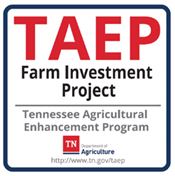|
Ag Enhancement Program To Offer New Options For Farmers

NASHVILLE, TENN.
The Tennessee Agricultural Enhancement Program (TAEP) is announcing new options and changes to better assist Tennessee farmers in diversifying, expanding, and improving their farming operations.
A recent review of the program aligns with Governor Bill Lee’s priority of advancing rural economic development. He supports TAEP and understands the value it brings to communities statewide.
“Agriculture is the foundation for our state’s economy, and our rural areas feel that impact the most,” Gov. Lee said. “TAEP is an investment that reaches far beyond the farming community – it bolsters local businesses, equipment manufacturers, and the countless citizens connected to the ag industry.”
With that focus in mind, the Tennessee Department of Agriculture (TDA) conducted a survey of TAEP participants and industry partners to gain feedback about current program offerings and ideas for the future. More than 2,400 people responded, with representation from all 95 counties.
The department also formed an advisory committee of 20 farmers from a variety of agricultural sectors statewide to identify opportunities for program improvements.
“The Ag Enhancement Program touches thousands of farming families all across Tennessee,” Agriculture Commissioner Charlie Hatcher, D.V.M. said. “That’s why we wanted to hear directly from those who know TAEP. We appreciate all who weighed in, and we look forward to seeing the result of these recommendations.”
Guided by survey responses and input from the committee, as well as priorities determined by TDA, TAEP changes for 2019 include:
• A new cattle herd health program aims to improve the health, reputation, and profitability of Tennessee cattle. Participating farmers will implement a preventative herd health protocol for beef and dairy cattle.
• In partnership with the University of Tennessee, the new cattle genetics online tool will assist in determining a bull’s eligibility for TAEP.
• To ensure more long-term investments, the verification period has increased. Applicants must utilize equipment and structures reimbursed with cost share funds for a minimum of five continuous years from the date of purchase.
• The Hay Storage program will not be offered for the 2019-2020 program year in order to launch the new Hay Equipment program. Hay production will be the focus, with hay mowers, mower-conditioners, tedders, rakes, and balers eligible for cost share. Participants must meet minimum requirements of 100 head of cattle, 150 head of goats or sheep, or 100 acres of hay in production.
• The renamed Working Facility Structures program features the Working Facility Cover for existing livestock working equipment and the Permanent Working Pen for receiving, separating, weaning, or holding livestock.
• The Grain Storage program is now called Row Crop Solutions. Cotton has been added as an eligible commodity. New items include drive-over scales, stationary fuel tanks, GPS displays and receivers, grain bin rescue tubes, and no-till drills. The maximum reimbursement has increased to $20,000.
• Application B for Producer Diversification has been simplified and shortened to ease the application process.
• Application C for Poultry Growers will now include ventilation fans and LED lights for retrofitting, as well as feed bins, poultry house trolley systems, and litter management equipment. The maximum reimbursement has increased to $10,000.
• The lifetime reimbursement limits for commodity sheds, grain bins, and livestock working facility covers have been removed.
“This isn’t a one-time review of TAEP,” Commissioner Hatcher added. “TDA will continue to seek input on this popular program to respond to the ever-changing agriculture industry.”
Established in 2005, TAEP is a cost share program that assists agricultural producers in making long-term investments on Tennessee farms and in rural communities. For every dollar the state awards to an eligible farmer, an estimated $3.89 is generated in the local economy. Since its launch, TAEP has invested more than $168 million in more than 57,000 producer projects, affecting every single county in Tennessee. ∆
|
|